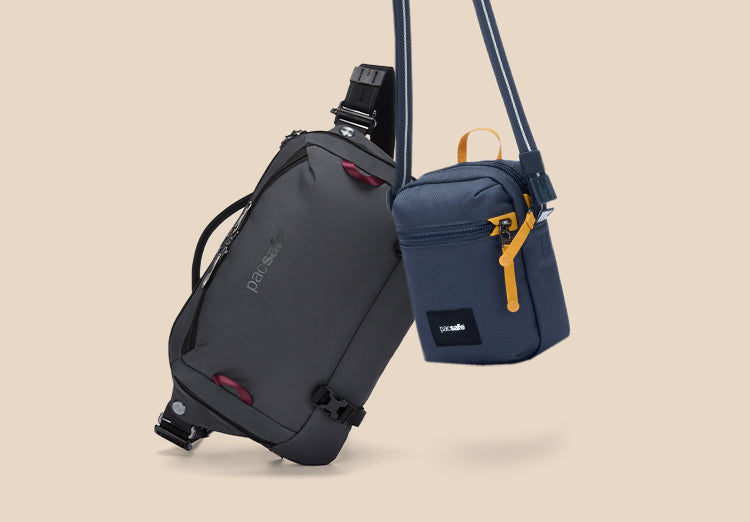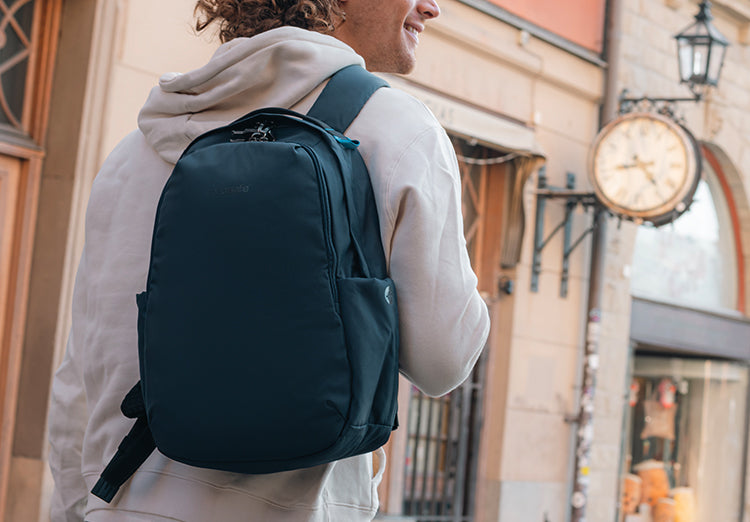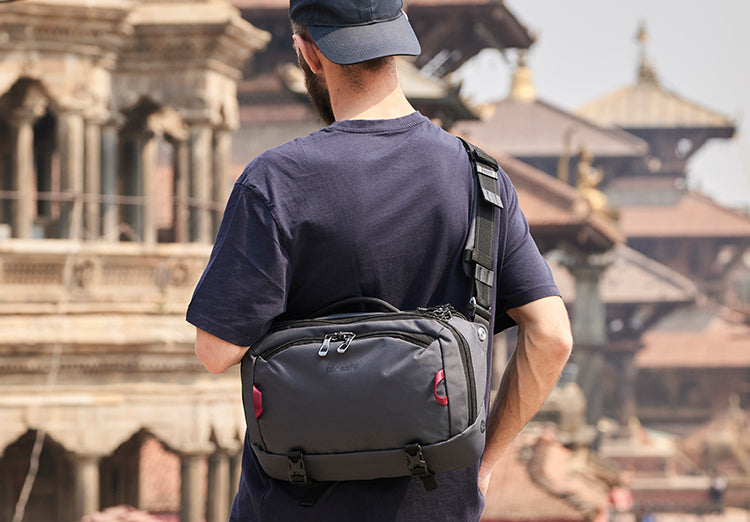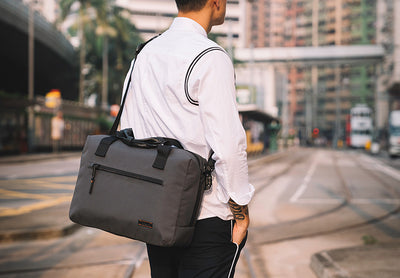Our Policies

We are working hard to constantly improve our policies and transparency throughout our supply chain. We want to do good and are always looking for ways that we can improve.
PRODUCT POLICIES
Design for Good
Our team selects high-quality, durable materials because making products that last is better for the environment. More durable products mean less energy consumption and less water usage, resulting in less waste for the landfill.
Durability Testing
To ensure that we make products that last, we have extensive internal durability testing in place. We stand by 100% what we make.
View our warranty policy
RESTRICTED SUBSTANCE LIST (RSL)
Pacsafe is committed to eliminating all harmful substances in our supply chain. We use guidelines on restricted chemical lists in REACH and conduct independent 3rd party testing of components used in our products.
REACH: Registration, Evaluation, Authorization and Restriction of Chemicals is a European Union regulation dating from 18 December 2006. REACH addresses the production and use of chemical substances, and their potential impacts on both human health and the environment.
More information on REACH can be found here REACH - Chemicals - Environment - European Commission (europa.eu)
PFC FreeAll Pacsafe products manufactured after July 1, 2020 are 100% PFC Free.
Pacsafe Testing Policy for REACH
Pacsafe will ensure to the best of our ability to have all components tested for compliance of REACH when they are developed, prior to launching these into the marketplace. Once these components have been tested and are verified by an independent 3rd party testing facility and are found to in compliance with REACH no change to the raw materials, manufacturing or component supplier is allowed. If there is any change to any of these 3 variables, the component must once again be independently tested and passed before the component is used in the supply chain.
Each year we will carry out random tests of components to check that they are in compliance with REACH.
Bluesign and GRS
All recycled fabrics we use are sourced from Bluesign certified suppliers and additionally follow the traceability requirements of Global Recycle Standard.
For more information on Bluesign certification click here https://www.bluesign.com/en
For more information on GRS please click here https://certifications.controlunion.com/en/certification-programs/certification-programs/grs-global-recycle-standard
PACSAFE PACKAGING POLICY
The purpose of this policy is to reduce the environmental impact of our packaging by optimizing consumer packaging, increasing recycling and recovery rates, and contributing to cleaner recycling streams.
Pacsafe considers four key principles in the design, development, procurement, and recycling of packaging to improve Packaging Sustainability and reduce the environmental impacts of its packaging.
It is the responsibility of all employees involved in the design of labels and packaging, and sourcing and development of Pacsafe packaging to follow this policy.
Our packaging design must consider the overall impact on the environment, minimizing the amount of packaging material used while maintaining the basic functions of packaging and minimizing product waste.
Our sustainable packaging aspirations aim to:
- Use FSC certified packaging materials in our packaging wherever possible.
- Ensure all packaging is recyclable, compostable, or reusable.
- Optimize packaging design to use the fewest materials necessary.
- Promote the use of materials that can be recycled or recovered.
- Minimize post-industrial waste.
- Avoid negative impacts to the environment.
- Achieve a lower carbon footprint by ensuring efficient energy usage across the product lifecycle.
- No PVC
- No laminates
- No composites
- No chlorine bleaches
- No heavy-metal based print dyes
- No laminating/ laminated coatings
- No fill materials from plastic or Styrofoam
- No VOC (Volatile Organic Compounds) -emitting labels or adhesive tape
- No materials from illegally harvested wood or High Conservation Value Forests
To further reduce our impact we follow these points in addition when considering packaging.
- Maintain standardized packaging across multiple product lines and sales channels to use resources efficiently.
- Work with vendors to continually identify better packaging and merchandising options that reduce environmental impacts.
- Use only reusable and/or recyclable packaging materials as available and appropriate.
- Paper and plastic packaging should have the highest possible post-consumer waste (PCW) content that meets requirements for functionality and quality: Our goal is to use materials made from 100% recycled content.
- Maximize the yield on substrates and paper rolls when negotiating and evaluating product.
- Request that materials not be shrink wrapped.
- Source catalog paper from FSC certified material or with at least 30% PCW content
- Use stickers to correct printing mistakes and avoid reprinting and associated waste.
- Review vendors’ environmental practices, including FSC and SFI certification of their papers and waste management in their facilities, as part of the RFP process.
- Maximize use of recycled and recyclable materials for displays and point-of-purchase collateral.
- Distribution Center to use the most appropriate-sized master box packaging to maximize the use of cargo space and reduce the carbon footprint of each shipment.
Individual Product Polybags
Whilst we all realize they are a major issue we still need them as they:
- Are a requirement from majority of retailers
- Protect products from moisture, which reduces waste from damaged goods
- Protect products from mold and damage during transport
- Protect products from damage or deterioration during storage
Unfortunately, at this stage we cannot eliminate polybags completely from our supply chain, but we are doing our best to reduce the use of individual polybags and moving to recycled polybags wherever possible. We are actively working on solutions to find environmentally sustainable options.
If you have suggestions on how we can better move away from individual polybags please email us!
PLANET
Our mission at Pacsafe is to protect what is valuable and nothing is more valuable than the planet we travel.
Together with our community we are pushing for positive change through positive actions. Since 2014 we have been active in giving back to Turtle Conservation globally. So far (2021) we have granted more than USD $150,000 to grass roots conservation efforts to support turtle conservation.
Starting in 2020 we also pledged 1% of all online sales will go directly to Turtle conservation through grants distributed by Pacsafe’s Turtle Fund.
Check out more details on Pacsafe Turtle fund here.
PEOPLE
Pacsafe Diversity & Inclusion Policy
Diversity and Inclusion are more than just words for us. They are principles guiding how we build our teams, cultivate leaders, and create a company that is the right fit for every person inside it. We are all travelers and have a global, multicultural outlook.
Pacsafe a diverse company and are determined to build a strongly inclusive culture which respects every employee for who they are – regardless of age, gender or gender reassignment, sex, or sexual orientation, marital or family status, disability, race including ethnic origin or nationality, religious or political beliefs and other characteristics that make our employees unique.
Pacsafe’s diversity initiatives are applicable to all aspects of our busines including our practices and policies on recruitment and selection; compensation and benefits; professional development and training; promotions; transfers; social and recreational programs; layoffs; terminations; and the ongoing development of a work environment built on the premise of gender and diversity equity that encourages and enforces:
- Respectful communication and cooperation between all employees.
- Dignity and human rights of colleagues and all others they meet as part of their employment.
- Teamwork and employee participation, permitting the representation of all groups and employee perspectives.
- Work/life balance through flexible work schedules to accommodate employees’ varying needs.
- Employer and employee contributions to the communities we serve to promote a greater understanding and respect for the diversity.
All employees of Pacsafe have a responsibility to treat others with dignity and respect. All employees are expected to exhibit conduct that reflects inclusion during work, at work functions on or off the work site, and at all other company-sponsored and participative events.
Any employee found to have exhibited any inappropriate conduct or behavior against others may be subject to disciplinary action.
Employees who believe they have been subjected to any kind of discrimination that conflicts with the company’s diversity policy and initiatives should seek assistance from a supervisor or an HR representative.
Pacsafe Diversity & Inclusion Marketing policy
Pacsafe aims to portray travelers as real people, regardless of race, ethnicity, gender identity, age, religion, ability, sexual orientation, or otherwise.
Our customers across the globe are diverse, so to reach and resonate with those diverse audiences, we need a diverse output.
We define inclusive marketing as creating content that truly reflects the diverse communities that our company serves. It means that we are elevating diverse voices and role models, decreasing cultural bias, and leading positive social change through thoughtful and respectful content.
It means that we are elevating diverse voices and role models, decreasing cultural bias, and leading positive social change through thoughtful and respectful content.
We believe that our responsibility as marketers is to relay our brands’ messaging in a way that resonates with people from all backgrounds.
Pacsafe Manufacturing Code of Conduct
Outpac Designs Ltd (“Pacsafe”) is committed to make sure that working conditions in Pacsafe’s supply chain are ethical and safe and that the manufacturing of Pacsafe products is environmentally responsible.
Any supplier, its affiliates, its and their sub-suppliers and its and their respective affiliates, its officers, directors, shareholders, employees, representatives, consultants, agents, assigns and subrogees (“Supplier”) that manufactures goods for Pacsafe or any of its subsidiaries or affiliates shall comply with the Pacsafe Supplier Code of Conduct (“this Code”). Pacsafe requires that Suppliers comply with each and every rule included in this Code. Violations of this Code may result in immediate termination as a Pacsafe’s Supplier and in further legal action.
- Compliance with Laws and Regulations
Suppliers shall, in any and all of their activities whatsoever, operate in full compliance with all applicable laws and regulations of the countries in which they are located, namely but not exclusively related to wages, working hours, employment, labor, health, safety, environment, immigration, and business practices.
- Prevention of Forced Labor
Suppliers shall not use involuntary or forced labor, including any form of slavery, indentured, bounded or prison labor, and including transportation, recruitment, transfer, or the receipt of workers by means of threat, coercion, fraud or abduction. Suppliers shall ensure that third-party agencies providing workers are compliant with this Code and the applicable laws.
- Prevention of Underage Labor
Child labor is strictly prohibited. The minimum age for employment or work shall be the higher of 16 years of age. This Code does not prohibit participation in legitimate workplace apprenticeship programs that are consistent with the applicable laws. Suppliers may employ minors who are older than the minimum age for employment or work as set forth here above but are younger than 18 years of age, provided they do not perform work likely to jeopardize their health, safety, or morals, provided they do not work overtime and provided all the applicable laws are respected.
- Anti-discrimination and Prohibition of Harassment
Suppliers shall not discriminate against any worker based on race, gender, color, age, sexual orientation, ethnicity, religion, disability, political affiliation, union membership, national origin, or marital status in employment practices, including hiring processes. Suppliers shall not require workers or applicants to undergo medical tests that could be used in a discriminatory way except where required by applicable laws. Suppliers shall prohibit sexual harassment, sexual abuse, inhumane treatment, corporal punishment, mental or physical coercion, verbal abuse, or unreasonable restrictions on entering and exiting the workplace.
- Women’s Rights
Suppliers shall ensure that women workers will receive equal remuneration, including benefits, equal treatment, equal evaluation of the quality of their work, and equal opportunity to fill all positions open to male workers. Pregnancy tests shall not be demanded of workers nor be a condition of employment. Workers shall not be forced or pressured to use contraception. Suppliers shall provide appropriate services and accommodation to women workers in connection with pregnancy.
- Working Hours
Except in extraordinary business circumstances or unusual situations, a work week shall be restricted to 60 hours including overtime and workers shall take at least one day off every seven days. Under no circumstances shall work weeks exceed the maximum permitted under applicable laws and regulations in the country in which the Supplier operates.
- Wages and Benefits
Workers shall be paid, as a floor and at the very least, the minimum wage required by local law or the prevailing industry wage, whichever is higher, and shall provide legally mandated benefits. In addition to their compensation for regular hours of work, workers shall be compensated for overtime hours at such premium rate as is legally required in the country in which the Supplier is located or, in those countries where such laws do not exist, at a rate at least equal to their regular hourly compensation rate. Suppliers shall offer vacation time, leave periods, and holidays consistent with applicable laws and regulations. Workers shall be provided with a clear, written accounting for each pay period.
- Freedom of Association
Suppliers must recognize and respect the right of workers to exercise their rights of free association, collective bargaining, and participation to workers’ organizations of their own choosing in accordance with applicable laws and regulations. Suppliers shall avoid any interference with the organization of workers’ unions or associations.
- Health and Safety
Suppliers shall comply with all applicable, legally mandated standards for workplace health and safety in the country in which they operate. Suppliers must provide their workers with a clean, safe and healthy work environment, designed to prevent accidents and injury to health occurring during the course of work. Suppliers shall eliminate physical hazards where possible, namely by providing appropriate controls such as physical guards, interlocks and barriers. Suppliers shall authorize workers to refuse working in unsafe working conditions. Suppliers shall control workers’ exposure to hazardous chemical exposure and shall not expose workers to hazards, including glues and solvents that may endanger their safety. Suppliers shall provide appropriate controls such as closed systems and ventilation. Suppliers shall establish safe work procedures. Suppliers shall identify emergency situations and implement procedures, plans, notifications to the workers and training of the workers in order to limit the risks for workers, namely through the creation and implementation of evacuation procedures, appropriate first-aid supplies, fire detection systems, exit facilities, etc. Suppliers shall establish procedures and systems to manage, track, and report occupational injury and illness and implement actions to eliminate their causes and provide necessary medical treatment. Suppliers shall evaluate and control workers exposure to physically demanding tasks, including namely heavy lifting and prolonged standing. Suppliers shall provide workers with clean toilet, access to potable water, and sanitary food preparation and storage facilities. Suppliers shall provide workers with appropriate workplace health and safety information and training in a language understandable by the workers. Suppliers shall provide information related to material safety for any hazardous or toxic substances used in the workplace. Suppliers shall properly train workers (i) in first aid, (ii) in the proper use of fire extinguishers, and (iii) in all matters relevant for the workers who come into contact with hazardous substances in the workplace.
- Dormitories
Suppliers’ dormitories shall be clean, safe and an healthy residence environment, namely by providing rooms of a maximum capacity of 8 people and sufficiently sized for their purpose. The dormitory shall provide adequate privacy, security, and freedom of movement for all occupants. The worker residence shall comply with all applicable law and regulations in the country in which it is located.
- Environment
Suppliers shall endeavor to reduce the environmental impact of their activities, manufacturing processes, and waste emissions. Suppliers shall respect applicable laws and regulations related to environment including energy, waste (wastewater, solid waste, waste of hazardous substances), pollution, air emissions and hazardous materials. Suppliers shall endeavor to make sustainable improvements in environmental performance including the recycling of materials such as paper, tin, plastic, etc. and require the same of their own suppliers and sub-contractors.
- Prohibition of Corruption
Suppliers shall respect the highest standards of ethical conduct. Corruption, bribery and extortion in any form whatsoever are strictly prohibited. Suppliers shall not violate any applicable anticorruption law and regulations of the country in which they operate.
- Community Engagement
Suppliers are encouraged to help the social and economic development and to contribute to the sustainability of the communities in which they operate.
- Protection of Intellectual Property
Suppliers shall respect intellectual property rights of Pacsafe and any third-party whatsoever.
- Confidential information
Suppliers shall protect and safeguard confidential information.
- Management Commitment
Suppliers shall establish and keep management procedures that will ensure compliance with this Code and applicable laws and regulations in the country in which they operate.
Suppliers shall:
- adopt a social and environmental responsibility statement.
- adopt and maintain processes made to identify and manage risks related to health, safety, environment, business ethics, labor, human and worker rights, and general legal compliance.
- adopt and maintain processes to identify and understand applicable laws and regulations and the additional requirements imposed by this code.
- communicate clear and accurate information about their performance, practices, and expectations to their workers, suppliers and customers and adopt and maintain a process for timely correction of any deficiencies identified by an internal or external audit, assessment, or review.
- Subcontracting
Suppliers will not utilize subcontractors in the manufacturing or the supplying of Pacsafe products or any component of such product without Outpac Designs Ltd's written approval and only after the subcontractor has agreed to comply with this Code.
- Monitoring and Compliance
Pacsafe shall have the right to audit (or to authorize a third party to audit) Suppliers facilities, with or without notice, to assess compliance with this Code. Suppliers will maintain on site all
documentation necessary to demonstrate compliance with this Code. Suppliers must allow Pacsafe representatives’ full access to production facilities, worker records and workers for confidential interviews in connection with monitoring visits. In addition, Suppliers must respond promptly to reasonable inquiries by Pacsafe representatives concerning the subjects addressed in the audit.
Pacsafe monitors the Ethical Trading Initiative and updates and monitors the policy regularly.
Find more relevant information see the below links
- Pacsafe Privacy Policy
- Pacsafe Culture and Values
- Pacsafe Turtle Fund









